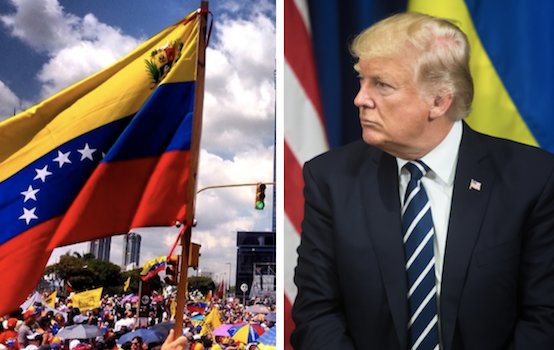U.S. tyranny moves against Venezuela’s elected government

TEHRAN - The gravity of the declaration of the coup d’etat against Maduro is sobering. The coup strategy integrates different variables: international pressure for recognition of the parallel government and chaos and death inside the country.
The current chain of events seems to have been planned out step-by-step: the attempted theft of weapons by a group of members of the Bolivarian National Guard on the morning of January 21, followed by incidents of violence concentrated in the west of Caracas; U.S. Vice-President Mike Pence’s video supporting Juan Guaidó and calling for demonstrations on January 23; the swearing-in of Guaidó; U.S. President Donald Trump’s recognition of Guaidó a few minutes later; ongoing incidents of violence; the convening of a meeting of the Organization of American States (OAS) to seek recognition of the parallel government; the U.S. $20 million announced by Pence for “humanitarian aid”; and yet more programmed violence.
Not everything went as planned. Regarding the international front, the attempt to get the OAS to recognise Guaidó as president failed, with only 16 votes out of 34. This is not a new failure: the Lima Group (formed in 2017 by right-wing Latin American governments), now weakened by the Mexican government’s anti-interventionist stance, emerged out of a similar situation.
At the extraordinary session of the Security Council, which was requested by the United States, U.S. delegates, their allies in the Lima Group and part of the European Union (EU) did not achieve their goals at the Security Council, while most other countries demanded respect for the sovereignty of Venezuela. Nineteen of the 35 countries rejected Venezuelan foreign intervention.
Venezuela's Foreign Minister Jorge Arreaza said at the UN Security Council: “They cannot lead us to a civil war in Venezuela.”
He further wondered why the U.S. was not judged by members of the UN Security Council, and added that the U.S. attempt to carry out the coup d’etat in Venezuela is obvious and this should be condemned by this organization. How can the U.S. President, who has threatened Venezuela with the military, not be questioned by the world? It is the U.S. that commands the opposition in Venezuela and the failed governments of the region.
Venezuela's Foreign Minister Jorge Arreaza is dismissing demands by European countries for President Nicolas Maduro to call new elections in eight days. He says the call is “almost childlike” and adds that the country “will not allow anyone to impose on us any decision or order.”
Leaders of Britain, France, Germany, Spain and Belgium issued statements Saturday saying they will recognize opposition leader Juan Guaido as Venezuela's president if Maduro doesn't call for a new vote for president in eight days.
In the case of the second variable, violence, the launch of planned violence occurred in different parts of Caracas along with media coverage. According to experts, some 40 percent of the demonstrations were violent, and some of them were opposed by the security forces.
The activation of a parallel government that has some international credibility, but not national credibility, has the power to influence economic moves such as attempting to close state assets or attract Citgo, a state-run affiliated company of PDVSA, which is located in the U.S. These attacks have aggravated the country's economic crisis. Meanwhile, it is expected that the “humanitarian aid” promised by Mike Pence at the OEA summit might bolster the parallel government.
Juan Guaidó has said that military intervention was “an option on the table,” and in the coup that the Bolivarian National Armed Forces confirmed, that “this factor is always taken into account.” Guaido's proposal is an armed program from outside, which can not be seen without domestic violence.
Defense Minister Vladimir Padrino Lopez said: “We will try to prevent confrontations between Venezuelans at any cost, a civil war cannot be the solution for the problems facing Venezuela.”
But one of the strategies proposed by the coup plotters are civilian conflicts.
The right-wing front insists it will not negotiate. But Nicolas Maduro has confirmed his willingness to conduct talks, according to statements by the government of Mexico and Uruguay. What if the conversation does not work?
It is strange that the issues of the Venezuelan government were largely unknown to anyone until early in January. It appears the proposed “president” wants to rule from Washington, or at least with Washington’s consent, and not that of the Venezuelan people.
Leave a Comment